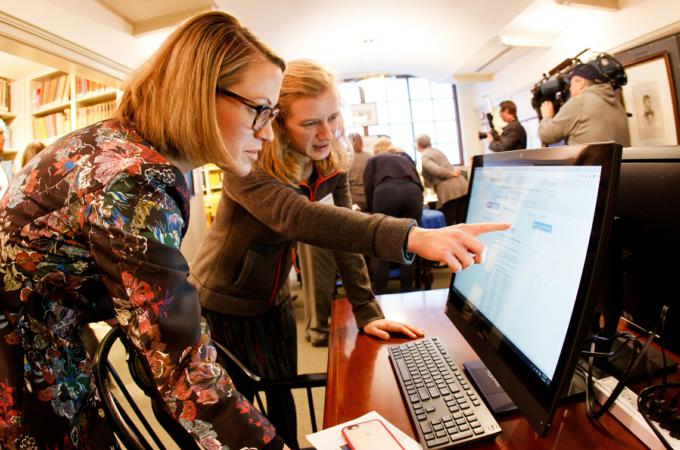Historic sacramental records going online
BOSTON -- Those searching for church records of their ancestors may soon find that task much easier, as the Archdiocese of Boston and the New England Historic Genealogical Society (NEHGS) have partnered to make a vast amount of historic sacramental records available online.
At a Jan. 10 press conference held at the genealogical society's headquarters in Boston, representatives from NEHGS unveiled a project the genealogical organization has been working on for the last several months -- uploading just under 950 volumes of sacramental records onto its online database.
The records, provided by the archives of the Archdiocese of Boston, span the years 1787 to 1900, and encompass over 150 parishes and more than 80 towns. They hold the names of around 10 million people, containing documentation of deaths, marriages, baptisms, and confirmations.
Putting the records online is a time-consuming process, and currently, only documents from four parishes and one mission have been placed online. However, over the next several years, it is the hope of the archdiocese and NEHGS that all of the records will be uploaded.
While the project is being fully funded by NEHGS, the speed of how quickly the records will be place online is dependent on outside funding, said NEHGS vice president and COO Ryan J. Woods at the press event.
"We have launched a fund, the Historic Catholic Records Fund, so the pace will be accelerated through philanthropy," he said, adding that the project could be completed in as little as three years.
Right now, the documents have been uploaded only as images, but as work continues they will be indexed and individual names will be searchable.
Speaking to The Pilot Jan. 5, the archdiocese's archivist Thomas Lester said that some time is needed, especially given that some of the early documents are written in different languages, including French, Latin, German, Polish, and Italian, and will need to be translated.
As the Diocese of Boston wasn't established until 1808, a number of early documents are also from different parts of New England and even Canada, coming from missions in those areas.
NEHGS staff and volunteers have been working to upload the records since the latter half of 2016, after finalizing a contract with the archdiocese. Discussions around the project began a year earlier, however, when Lester reached out to the organizations.
"The sacramental records is one of the records I focused on when I started here, just because of all the genealogists we have using it," Lester said.
He said the decision to partner with NEHGS was in part to help preserve the records, which, due to their age and their frequent use, are "deteriorating fairly quickly."
"So, part of the way I wanted to preserve them was having a digital backup of each book," he said, adding that NEHGS has been working to physically preserve some of the books as well.
Putting them online was also a way to make the records far more accessible to the public, saving people a trip from having to physically visit the archives at the archdiocese's Braintree headquarters, previously the only way the records were accessible.
Lester noted that while NEHGS will be scanning all of the archive's sacramental records, only those from 1787 to 1900 will be made public.
"We're talking 117 years ago now. We think that's a fair amount of time before we let someone's information sort of out into the world," he added.
At the press event, NEHGS President and CEO D. Brenton Simons thanked the archdiocese for providing the records, and noted that when finished, the project will yield the "largest collection of American Catholic genealogical records online."
"This is truly a gift to Boston, and to the world," he said.
His sentiments were echoed by other NEHGS leaders, as well as Bishop Robert Reed, auxiliary bishop of Boston and president of The CatholicTV Network, who represented the archdiocese at the event.
"The sacramental records of the Archdiocese of Boston are essential to us to understand our past, and our present, and our future as a Church," said Bishop Reed.
"What these volumes contain are evidence of an individual's faith, and this is something that is really internal and intangible," he said.
The records can be viewed by going to catholicrecords.americanancestors.org, a website NEHGS created for the project that contains additional information about the history of the Archdiocese of Boston and the project itself. While there is no cost to view the records, users must register with the site to access the database.



















